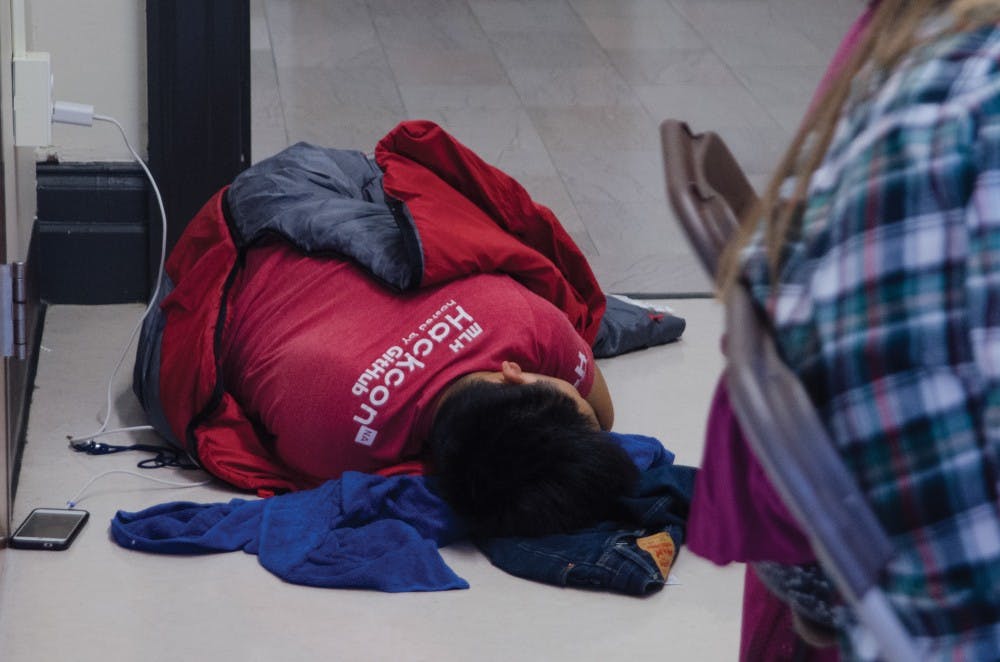
We frequently tell and hear stories of heads bobbing down and jerking back up in lecture halls, notes that progress into scribbles, and all-nighters pulled for exams the next day. We complain about how we were too tired to concentrate in class. We rely on caffeine to succeed in our classes and get us through our days. As the semester goes on, “tired” becomes as common a response as “busy” to the question “How are you?”
A lot of students buy in to the notion that headaches, sleepiness, and a slow brain — the aftermath of all-nighters or the effects of too many sleepless nights — are part of the price of a college education.
I’ve often felt alone in believing that we should expect to get enough sleep. It seems that many of us, through the ways we think about, talk about, and practice sleep, treat being well rested as a luxury instead of a part of our routines.
We shouldn’t accept sleep deprivation as a normal or necessary part of college. Not only is sleep deprivation a blight on productivity, it is detrimental to our general well-being as well. Shifting away from our perception of sleep deprivation as an inherent part of college life to a problem we must solve would help replace some of Penn’s toxicity with an atmosphere that supports and promotes well-being.
Sleep deprivation has various negative short term and long term effects on our physical health. Sleep is important for cardiovascular health, immune system function, cell and tissue repair, hunger hormone regulation, blood sugar regulation, learning, decision-making, and emotion regulation. Losing sleep increases our risk of developing various diseases and disorders. Getting good sleep, on the other hand, allows us to acquire, consolidate, and recall memories — and get more than a grade out of our efforts.
It can sometimes seem impossible to balance schoolwork, jobs, activities, friends, and our well-being. While it makes sense to value academics, pursue extracurricular interests, and build relationships with people in college, it doesn’t make sense to sacrifice sleep to make that happen. Instead, we should recognize that sleep allows us to do well the things we want to do when we’re awake.
Starting to get good sleep can be difficult. This past school year, although I had trouble falling asleep — and staying asleep — I limited my hours for studying, tried to keep a consistent sleep schedule, and started exercising. We don’t have to exhaust ourselves before we reorient our lives. Whether we’ve caught free time or are caught up in chaos, it could be a good time to evaluate how we spend our time.
Our time in college shouldn’t just be something to get through, plagued by exhaustion that makes it hard to participate in, process, and reflect on our experiences. Life, including life in college, is and will be hard, but we don’t need to make it harder on ourselves by believing that we need to suffer through sleeplessness. We also don’t need to make it harder on others by contributing to the attitude that sleep is for when we feel that we’ve accomplished enough or that not getting enough sleep is a regular part of college that we need to accept.
The notion that being in college and living a healthy lifestyle are mutually exclusive is concerning. Treating sleep deprivation as a given and sleep as a luxury feeds an unhealthy culture of impossible standards. While there are a variety of factors contributing to the quantity and quality of sleep we get, we should view obstacles to good sleep as problems to address.

PEARL LIU is a College freshman from Farmington, Conn. Her email address is pearlliu@sas.upenn.edu.
The Daily Pennsylvanian is an independent, student-run newspaper. Please consider making a donation to support the coverage that shapes the University. Your generosity ensures a future of strong journalism at Penn.
Donate



